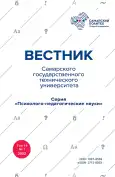The methods of forming soft skills of university students: theoretical and practical aspects
- Authors: Uskova B.A.1, Fominykh M.V.2
-
Affiliations:
- The Russian State Vocational Pedagogical University, Ekaterinburg
- The Russian State Vocational Pedagogical University
- Issue: Vol 19, No 1 (2022)
- Pages: 77-92
- Section: Higher school education
- URL: https://journal-vniispk.ru/1991-8569/article/view/71720
- DOI: https://doi.org/10.17673/vsgtu-pps.2022.1.6
- ID: 71720
Cite item
Full Text
Abstract
This paper describes the theoretical and practical aspects of the methodology for the formation of students’ soft skills. Innovation processes are implemented today in almost all spheres of human activity. In particular, this applies to the field of education. As for professional education, the university should maintain interest in modern technologies, socio-economic changes in society, and the development of new trends and directions. Such processes include the formation of supra-professional skills, in other words, soft skills. They are not related to a particular profession, but are important for a career and advancement in it. The process of forming such skills can be implemented in English classes. In this regard, to create conditions conducive to the formation of soft skills, as well as to make the learning process more informative and memorable, the authors of the paper developed a set of tasks for the formation of soft skills competencies. Since the development of these skills is important for preparing for a future profession, the target audience is junior students. The purpose of this paper is a theoretical justification of the methodology for the formation of soft skills competencies. The practical significance of the research lies in the fact that the results can be used in the course of foreign languages teaching methodology.
Keywords
Full Text
##article.viewOnOriginalSite##About the authors
Bella A. Uskova
The Russian State Vocational Pedagogical University, Ekaterinburg
Email: bouskova@mail.ru
ORCID iD: 0000-0002-9204-0311
SPIN-code: 4641-3475
Scopus Author ID: 57191439594
ResearcherId: U-8338-2017
Cand. Ped. Sci., Associate Professor, Head of English Philology and Professional Communication in Foreign Languages Department of the Institute of Psychological and Pedagogical Education
Russian Federation, EkaterinburgMaria V. Fominykh
The Russian State Vocational Pedagogical University
Author for correspondence.
Email: fominykh.maria@yandex.ru
ORCID iD: 0000-0002-9700-4483
SPIN-code: 7766-5257
Cand. Ped. Sci., Associate professor of English Philology and Professional Communication in Foreign Languages Department of the Institute of Psychological and Pedagogical Education
Russian Federation, EkaterinburgReferences
- Fominyh M.V., Uskova B.A., Vetlugina N.O., Luzyanina T.V. Vnedrenie v sovremennyj uchebnyj process innovacionnyh tekhnologij obucheniya. Ekaterinburg: Izd-vo Ros. gos. prof.-ped. un-ta, 2021. 95 p.
- Lyzhin A.I. Institut nastavnichestva kak tekhnologiya privlecheniya i podgotovki novyh rabochih kadrov. Innovacionnaya nauchnaya sovremennaya akademicheskaya issledovatel’skaya traektoriya (INSAJT). 2020. No. 1 (1). P. 15–24.
- Certel Z., Bahadır Z., Kabaca E., Seraki S. Professional experience, tolerance, empathy and reading interests as variables predicting cognitive flexibilities of physical education teachers. International Journal on New Trends in Education and Their Implications. 2018. Vol. 9. Issue 3. P. 41–51.
- Claxton G., Costa A.L., Kallick B. Hard thinking about soft skills. Educational leadership: journal of the Department of Supervision and Curriculum Development. N.E.A. 2016. Vol. 73. P. 60–64.
- Levasseur R. People Skills: Developing Soft Skills — a Change Management Perspective. Computer Science. Interfaces. 2013. Vol. 43, No. 6, November–December 2013. P. 566–571.
- Wilkie D. Employers Say Students Aren’t Learning Soft Skills in College. SHRM – The Voice of All Things Work. October 21, 2019. URL: https://www.shrm.org/resourcesandtools/hr-topics/employee-relations/pages/employers-say-students-arent-learning-soft-skills-in-college.aspx.
- Sessiya «Molodyozh’-2030. Obraz budushchego». Prezident Rossii. URL: http://www.kremlin.ru/events/president/news/55890.
- Whitmore P.G., Fry J.P. Soft Skills: Definition, Behavioral Model Analysis, Training Procedures. Professional Paper. 1974. Pp. 3–74.
- Gajduchenko E.A. Emocional’nyj intellekt vs IQ: ot chego zavisit uspeh. URL: https://l-a-b-a.com/blog/show/114
- Davletshina Yu.M., Ivonina A.I., Chulanova O.L. Sovremennye napravleniya teoreticheskih i metodicheskih razrabotok v oblasti upravleniya: rol’ soft-skills i hard skills v professional’nom i kar’ernom razvitii sotrudnikov. Internet-zhurnal «Naukovedenie». 2017. Vol. 9. No. 1. 18 p. URL: http://naukovedenie.ru/PDF/90EVN117.pdf
- Lippman L.H., Ryberg R., Carney R., Moore K.A. Workforce connections: key «soft skills» that foster youth workforce success: toward a consensus across fields. Child Trends Publication. 2015. 56 p.
- Stepanova L.N. Soft skills kak prediktory zhiznennogo samoosushchestvleniya studentov. Obrazovanie i nauka. 2019. Vol. 21. No. 8. Pp. 65–89.
- Gizatullina A.V., Shatunova O.V. Nadprofessional’nye navyki uchitelej: soderzhanie i vostrebovannost’. Vysshee obrazovanie segodnya. 2019. No. 5. Pp. 14–20.
- Shipilov V.I. Perechen’ navykov soft-skills i sposoby ih razvitiya. Internet-proekt Korporativnyj menedzhment: finansy, biznes plany, upravlenie kompaniej. URL: https://www.cfin.ru/management/people/dev_val/soft-skills.shtml
- Zalunin V.I. Nekotorye problemy i formy realizacii proektnogo obucheniya v processe prepodavaniya gumanitarnyh disciplin v vuze // Tendencii razvitiya obrazovaniya: pedagog, obrazovatel’naya organizaciya, obshchestvo – 2019: materialy Vseross. nauch.-prakt. konf. s mezhd. uchast. (Cheboksary, 19 avg. 2019 g.). Cheboksary: ID «Sreda», 2019. Pp. 235–239.
- Nenahov I.G. Ocenka netradicionnyh i smeshannyh metodov obucheniya s tochki zreniya ustojchivosti vnimaniya obuchayushchihsya vysshej shkoly. Cheboksary: ID «Sreda», 2019. Pp. 82–91.
- Puzejkina L.N., Boyarkina A.V. Rasshirennye vozmozhnosti prepodavaniya inostrannogo yazyka v vuze s ispol’zovaniem sistem distancionnogo obucheniya (na primere kursov setevogo soprovozhdeniya auditornyh zanyatij po nemeckomu yazyku). Pedagogika. Psihologiya. Filosofiya. 2018. No. 4 (12). Pp. 61–70.
- Ruchko L.S. Cifrovye kompetencii: problemnye zadaniya dlya obuchayushchihsya. Luchshie praktiki «Vyzov tsifroj»: materialy Vseros. nauch. konf. s mezhdunarodnym uchastiem (Cheboksary, 23 mart 2020 g.). Cheboksary: ID «Sreda», 2020. Pp. 54–58.
- Weitze C.L. Designing for learning and play: The smiley model as a framework. Interact. Des. Archit. 2016. No. 29(1). Pp. 52–75.









